Script coverage example: how to learn what readers are looking for.
Just what is script coverage exactly? On this page, you can download a script coverage example of the various kinds used in the industry.
Let's start by answering some basic questions about script coverage. Then we'll take a look at a script coverage template of each type.
What is script coverage?
Script coverage is a written document consisting of a reader's feedback on a screenplay or TV script (teleplay). Another term given to it is "script notes." They can be written by a variety of different people for a variety of different reasons.
Overall, script coverage sums up a reader's thoughts and emotional reaction to a screenplay/teleplay. It usually includes notes on all or some of the following:
• Concept
• Character
• Story
• Plot/structure
• Scenes
• Theme
• Genre
• Pacing
• Tone
• Dialogue
• Marketability
• Writing style
• Formatting/presentation/grammar
• Title
• Final rating: "recommend," "consider" or "pass"
Bear in mind, there is no one "right" way to write script coverage. Nor is there such a thing as a "standard" script coverage template.
One may include a synopsis of the script. Another may not. Some script coverage comments on all of the elements listed above. Others only two or three. Some are only one page in length. Others run to fifteen pages or longer.
As you'll see in the script coverage examples below, it can vary greatly in intent and purpose, according to who it's written by. And who it's written for.
Here's a list of the various types of notes in the industry, along with a script coverage example of each one.
Script coverage example #1:
development execs and producers.
Development executives want to find screenplays to turn into movies. Producers want to invest in these screenplays in order to help them get made into movies.
Not having the time (or inclination) to read everything that comes their way, execs and producers often employ script readers to write coverage on incoming material. From this, they then read the coverage on the best scripts that have come in.
The buffer zone.
Script readers, therefore, can be thought of as a kind of buffer zone between the writer and the exec or producer.
If the script is as good as a reader says it is, then the exec or producer may set up a meeting with the writer. Thus, the long road to seeing their work up on the silver screen begins.
Script coverage for a development exec or producer is also known as "studio notes." It tends to be only one or two pages in length, with a focus on briskly assessing the script's suitability for development.
This is in direct contrast to other script report examples that focus on helping the writer improve their script. We'll get to this type later.
Screenplay coverage example for execs and producers.
Here's a script coverage template of the kind written for development execs and producers. They're written in a style purely with the exec/producer in mind, rather than the writer.
(Please note: This is not a script coverage sample from our company.)
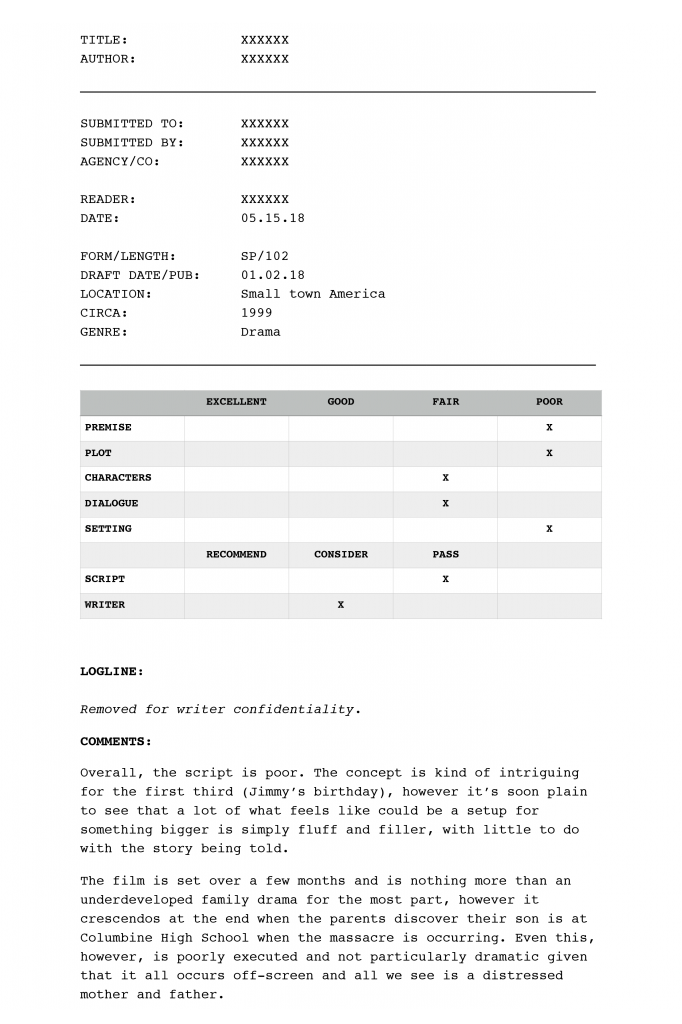
To keep reading the full script coverage sample click the button below.


Script coverage example #2:
managers and agents.
Whereas execs and producers are looking to get films made, managers and agents are looking for writers to represent and develop.
However, the exact same screening process applies. Script readers first review all the scripts sent into their offices by writing a script report on each one.
Also, it's worth noting that—just as with development execs and producers—these script reports are not always written by professional script readers, but by assistants and interns.
Whoever writes the script report, however, will be primarily looking at the writer's potential as a client for the manager or agent in question.
This is where writing samples can come in handy for the aspiring screenwriter.
Rather than writing a script that they hope to get made by sending to an exec or producer, they instead write a script that showcases their skills.
This is in the hope of getting taken on by a manager or agent.
Script report example for managers and agents.
You'll notice in this script coverage template that they're written in a very similar style to those written for execs and producers. Very direct, short and lacking any "how-to" feedback for the writer.
(Please note: This is not a script coverage sample from our company.)
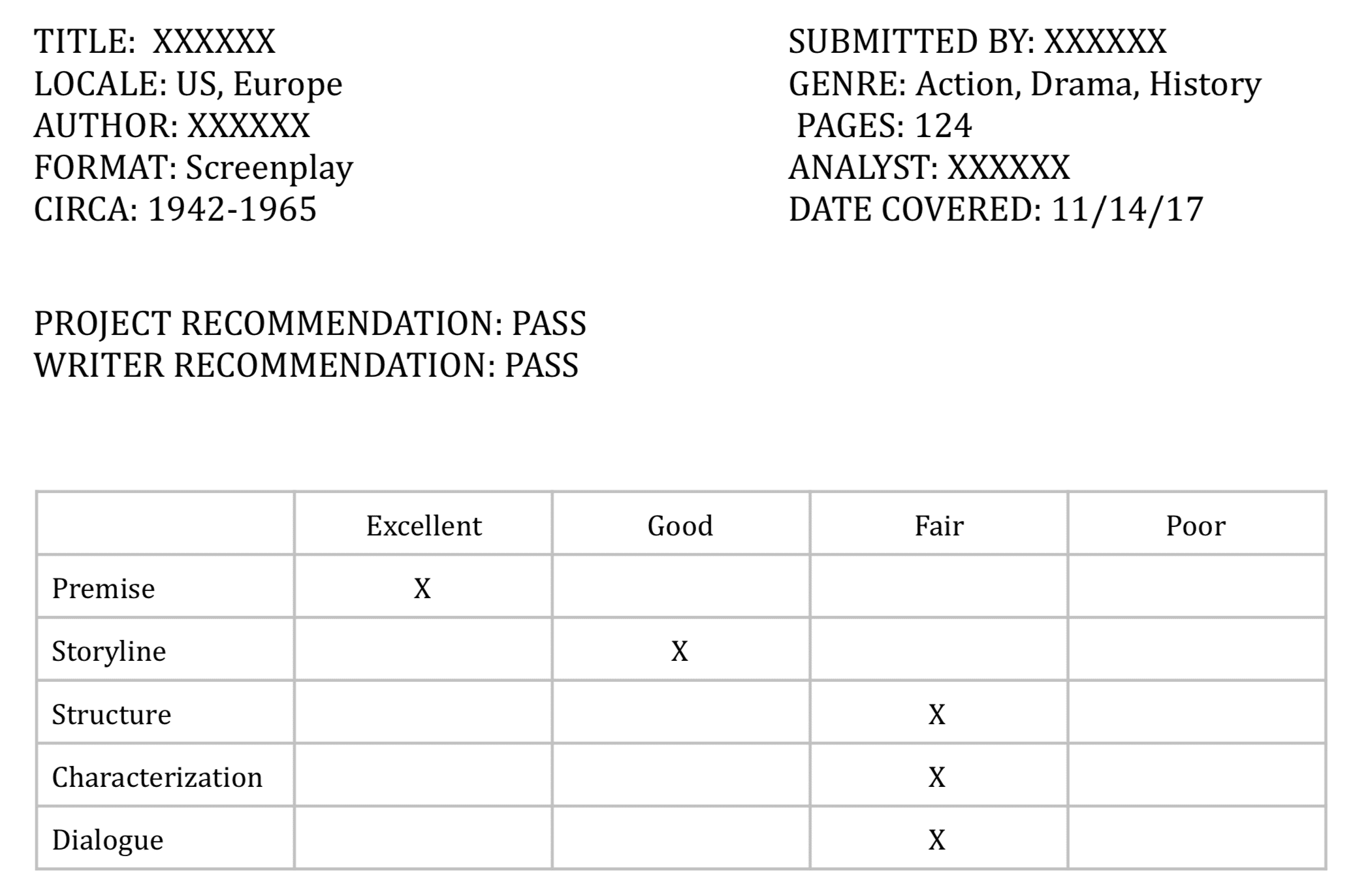
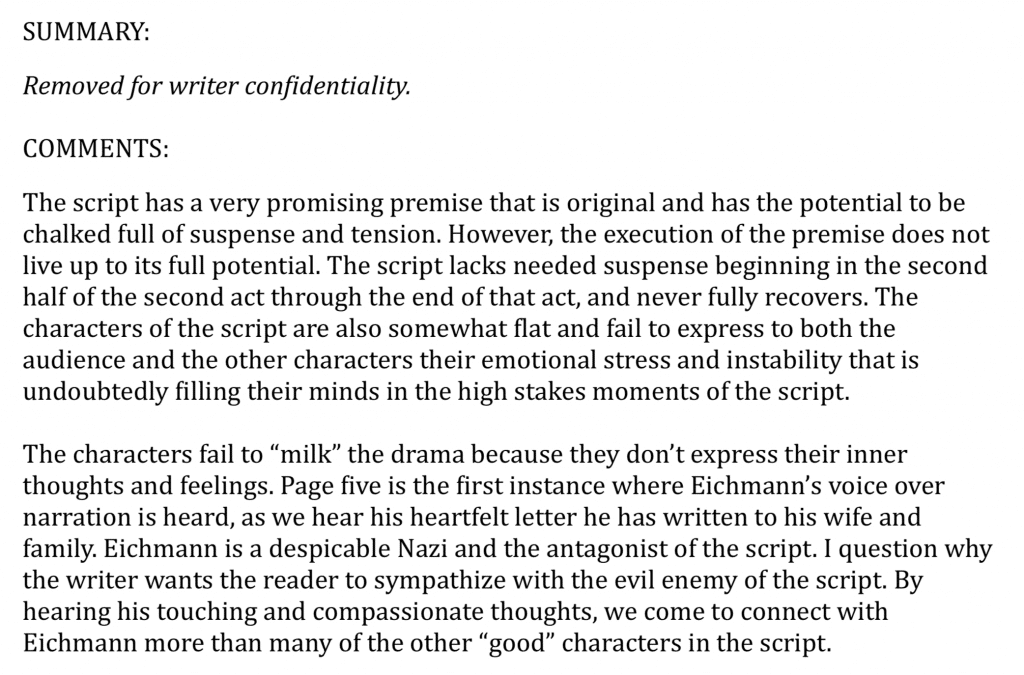
To keep reading the full script coverage sample click the button below.

Script coverage example #3:
feature and TV writers.
All of the script coverage examples we've covered so far have been geared toward someone higher up the chain reading the notes. Now let's take a look at a script report example written for the benefit of the writer.
The purpose of this kind of script coverage is to get a screenplay into shape before the writer sends it off to an exec, producer, manager. Or anyone else of importance in the industry.
It acts as a kind of dry run in order to get a script into shape and improve the writer's craft, thus avoid burning any bridges before their career has even begun.
Script coverage template for writers.
As you'll see in the following script coverage example, these notes are designed to guide a writer on how to improve their screenplay and also their craft in general. Well, that's what our script coverage services do here at Script Reader Pro anyway.
The truth is, there are many script consultancies and self-confessed "gurus" out there. But in order to make an informed choice on who to pick, we strongly recommend you ask to see a script coverage example of their work before parting with your cash.
(Please note: The following is a script coverage sample from our company.)

Check out a Classic Feature script coverage sample below or download it here:
Script consultancies like ours and independent script analysts, provide a huge variety of script coverage services for writers.
Script report examples of our most popular services.
• Classic Feature Script Coverage example (4+ page script report)
• Deluxe Script Coverage example (12+ page script report)
• TV Script Coverage example (4+ page script report)
• Margin Notes example (on-the-page notes)
• Line Edit example (on-the-page edits)
• Proofread/Formatting example (on-the-page edits)
(Note: Technically, services like a Line Edit and Margin Notes are more akin to something a script doctor would perform. But many companies like ours refer to them all as "script coverage services" for simplicity's sake.)
Conclusion.
All three script coverage examples are written with a specific purpose in mind. Either to log the quality of a submitted script at a company and alert the exec, producer, etc. to any exceptional ones.
Or, to provide the writer themselves with a paid service in which they're told how their script would fare were it to be sent out into the industry.
The style, content and depth of analysis can vary quite a bit between different production companies, etc. and individual analysts.
Company A may love your script, while company B doesn't. Indeed, reader X at Company A may love your script, while reader Y doesn't.
Most companies have their own "in-house" way of writing a script report. But budding writers shouldn't preoccupy themselves too much with this. Instead, they should simply focus on writing the very best script they can.
Get feedback sooner rather than later.
In general, it's always advised that a writer gets a professional opinion on their work before sending it out into the industry.
The ideal solution is to give it personally to someone you know who works in the industry, preferably in development.
Don't fall into the trap many aspiring screenwriters make of just sending a script to a producer because your best friend thinks it's great.
However, not everyone has friends or people they know in the industry. The next best thing is to pay a professional company to evaluate your script.
Let them show you how to fix any problems it may have, rather than risking sending it out without knowing if it makes the grade.
Overall, whether you decide to let us or another screenplay consultancy write a script report on your work, always make sure you ask to see a script coverage example first.
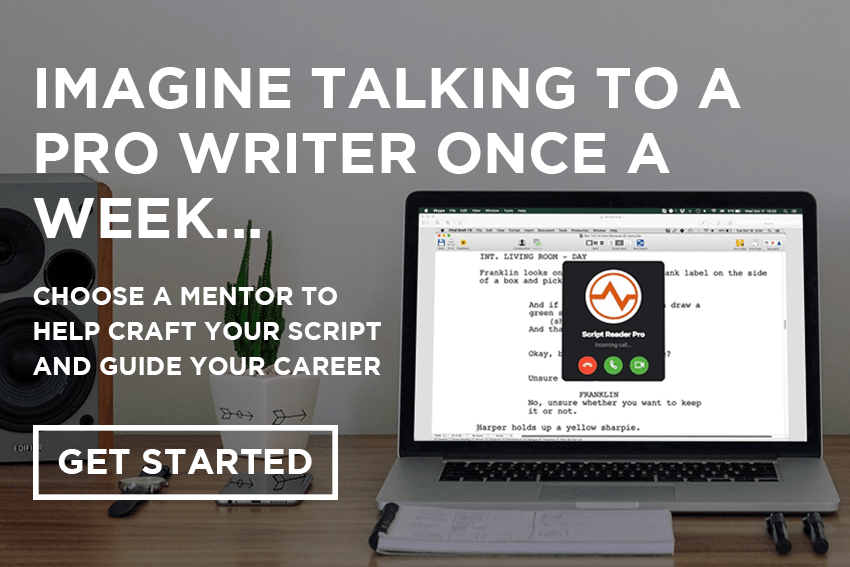
Enjoyed this post on script coverage examples? Read more on how to become a screenwriter...
How to Write a Script Outline That Will Save You Months of Rewrites
How to Become a Screenwriter: A Pro's Guide to Unlocking Your Career
How to Sell a Screenplay: 6 Most Popular Ways New Writers Make a Sale
[© Photo credits: Pexels]
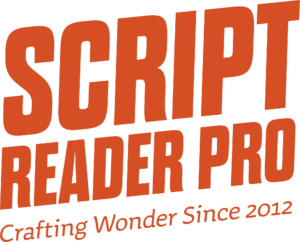














MARCO! POLO!
A warm and very human story about six California girls who keep in touch from childhood through adulthood.
What helps keep their bond of love alive is a tragedy that befalls one of the group and their persistence in uncovering the cause.
good-job, guys!!!
I want to contact someone in your team directly, a writer who can rewrite my script. It's a scifi thriller set in the near future. Give me a phone number please I cant see one on the site.
You can purchase an Initial Assessment and choose the reader you'd like to write up a page of notes on how they'd approach the rewrite here.
Really helpful. I am not sure to get in contact with an agent or start to try and sell my script by myself via these websites. Also there is a high chance - if anyone will buy it- that they will change it anyway.
Thanks, Titus! Have you seen this post on how getting a manager is a better step than going for an agent?
Really helpful post. Thanks Script Reader Pro.
You're welcome, Francine!
Great post! Thanks Alex and the ScriptReaderPro team!
Hi, Michelle - thanks for the comment!
Has anyone used the Ink tip? I don't want to pay .
InkTip's really good for making connections.
I want to sell my script. Contact me and I will give u details.